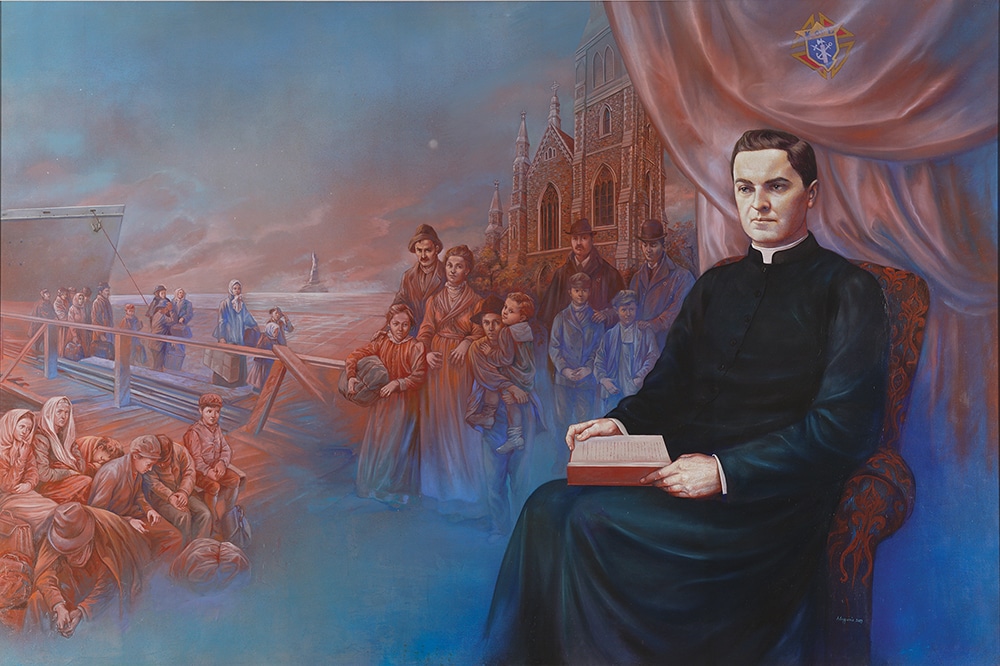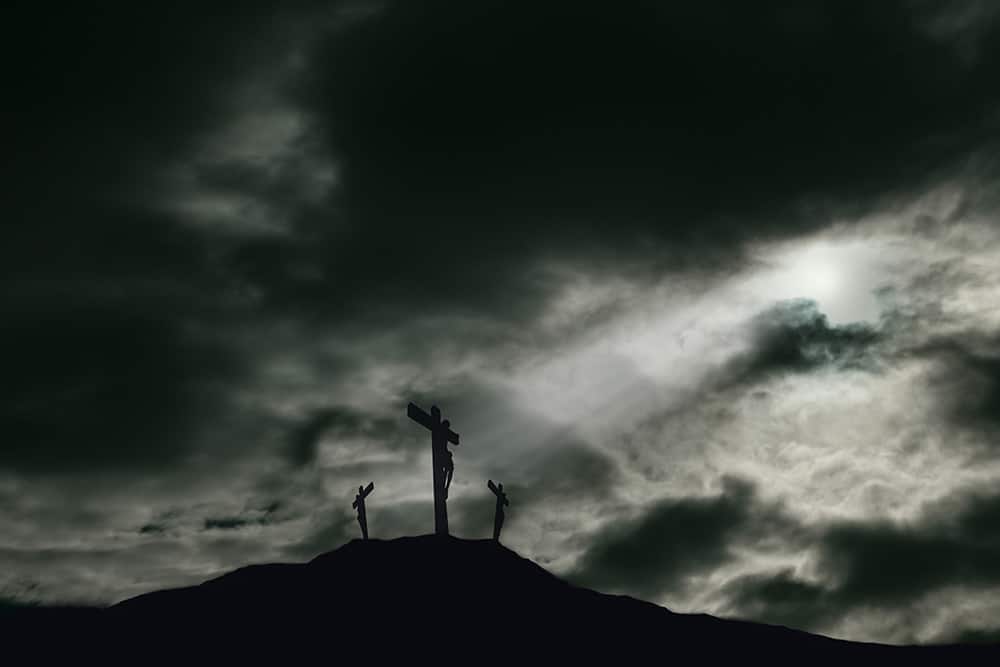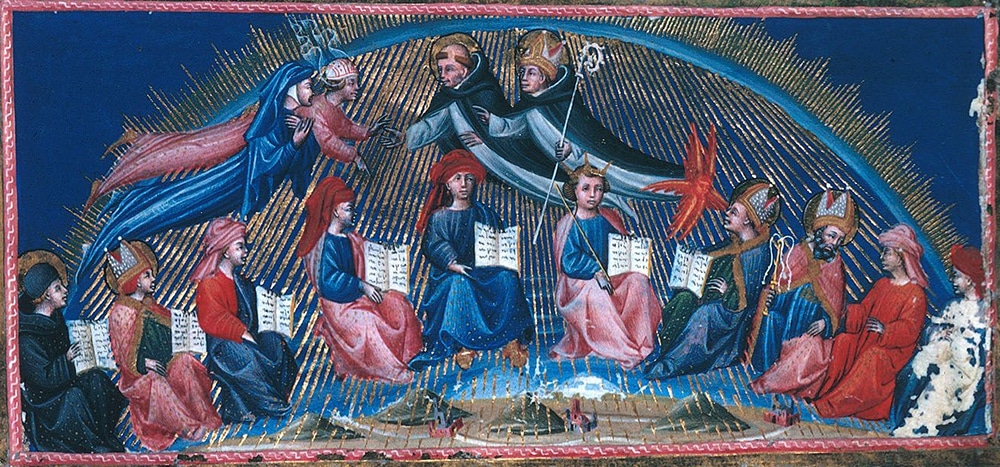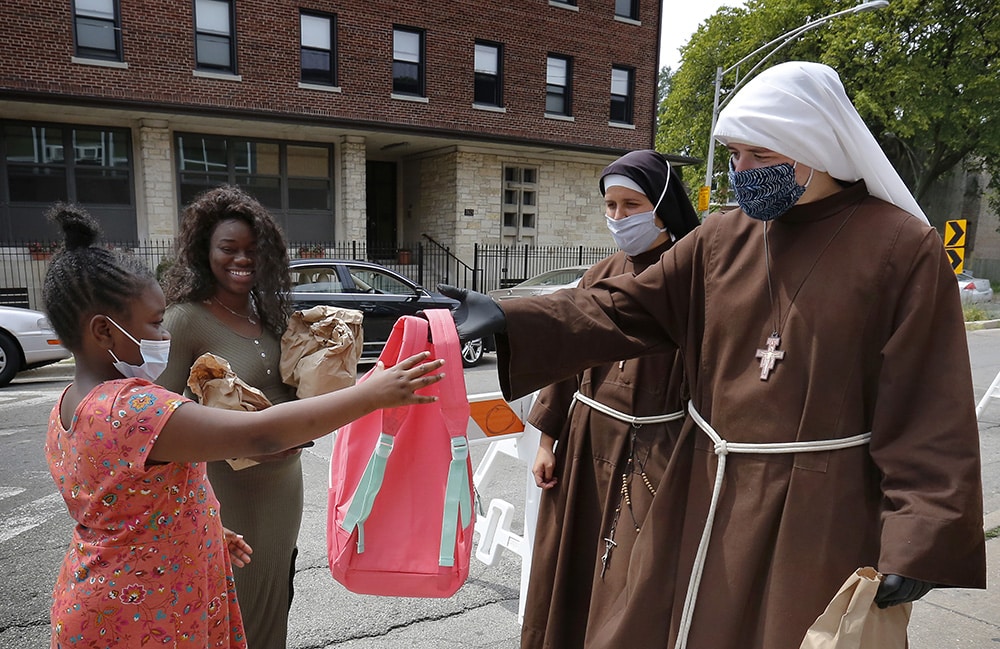The beatification of Father Michael J. McGivney shows that the ministry of this holy, humble parish priest continues even to this day. This is evidenced in the miracle attributed to his intercession, which was approved by Pope Francis in May, involving the healing of a fatal condition called hydrops for a young boy in his mother’s womb.
| Beatification Mass |
|---|
| The beatification Mass will be livestreamed on Oct. 31 at 11 a.m. ET at Saint Joseph’s Cathedral in Hartford, Connecticut. Join the celebration by watching the livestream provided by EWTN or on OSV’s Facebook page. For more information, visit: kofc.org/beatification. |
Most widely known as the founder of the Knights of Columbus, the international Catholic fraternal organization based in the United States, Father McGivney strove for holiness as a parish priest in Connecticut during challenging times. In at least two specific ways, his beatification arrives at a providential moment — during a pandemic and during a time of continued scandal for Catholic clergy, when examples of holy priests are needed more than ever.
Father McGivney himself died at 38 after becoming the victim of a pandemic, undoubtedly having contracted the disease from ministering to others suffering from it, which many believe was a coronavirus. And Cardinal Angelo Becciu, who was slated to preside at Father McGivney’s beatification, recently was sacked by the pope from his position as prefect of the Holy See’s congregation for the causes of saints after being linked to numerous financial scandals. In many ways, raising up Father McGivney and his witness is a sign of hope for the Church at a time it is desperately needed.
Path to priesthood
Michael Joseph McGivney was born in 1852 as the first child of Irish immigrants in Waterbury, Connecticut — a state once known for its rampant anti-Catholicism. He came of age at a time of booming industrialization in the Northeast. Although studious from a young age, McGivney left school at 13 to work in a local brass factory making spoons, hoping to contribute to helping make ends meet in his struggling family. At 16, just after the end of the Civil War, he began the path toward priesthood, which was itself not without difficulty. In fact, in many ways it was an exercise in repeated opportunities for perseverance, among other virtues.

The pastor at McGivney’s home parish had a strong influence on him. Father Thomas Hendricken — the future founding bishop of the Diocese of Providence, Rhode Island — was himself filled with pastoral zeal and successful in guiding young men to consider the priestly vocation. McGivney set out to follow in his footsteps in 1868, and Hendricken accompanied him to seminary in Quebec. Given the large numbers of French-Candian immigrants coming to Connecticut at the time, McGivney was advised of the bishop’s hopes for future priests to become familiar with their language and culture. McGivney was a dedicated student at the College of St. Hyacinthe outside of Montreal, although the program there was not administered according to his bishop’s intentions. Despite his academic successes, the transition to some of the fields of seminary studies brought some difficulty. McGivney left after two years and took a year off.
In 1871, McGivney enrolled as a student at the Seminary of Our Lady of the Angels in Niagara Falls, New York. In each of the two seminaries he attended up to this point, McGivney was accompanied by a large group of other seminarians from Connecticut, most of whom were also proteges of Hendricken. In McGivney they found a pious young man dedicated to his studies but also rich in good humor. And he was a fast runner in the seminarians’ foray into the burgeoning sport of baseball. There only a year, McGivney successfully completed the requisite courses to enter major seminary in 1872. He returned to Quebec as a student at the Jesuit-run St. Mary’s Seminary in Montreal.
McGivney’s stay in Montreal was short-lived. Although he seemed intent on joining the Jesuits at the time, McGivney left at the end of the academic year when his father died in June 1873. Returning home for the funeral, McGivney was left without financial assistance to continue his studies.
Once it was clear his family did not need his assistance to earn a living, McGivney learned that his bishop in Hartford was willing to financially sponsor him as a seminarian for service in the diocese. He was sent to St. Mary’s Seminary in Baltimore, the nation’s oldest, founded by Sulpician priests from France when George Washington was president. There McGivney studied for four years before his ordination on Dec. 22, 1877, at America’s first cathedral, now the Basilica of the National Shrine of the Assumption of the Blessed Virgin Mary in Baltimore.
A good, holy priest

By all accounts Father McGivney’s personal and vocational characteristics made him a model priest. He was regarded as saintly by the elderly and infirm for whom he cared, by the mothers whose children he taught catechism and by the imprisoned and marginalized with whom he visited. Even non-Catholics were impressed by his authenticity.
Father McGivney had an attractive, good-humored and warm personality, described as “almost childlike,” by one observer. He was amiable and unassuming, yet zealous in his love for souls and the Lord. Clear-headed and exact in speech, yet soft-spoken, Father McGivney was unafraid to teach as the Church does. He was determined and methodical in whatever he set out to do, a dedicated leader without pretense or selfish ambition. He engaged and collaborated with laity in a revolutionary way, always motivated by his concern for their relationship with Christ and their welfare. He was unafraid to roll up his sleeves and take on work then considered beneath the dignity of priesthood for the good of his people.

Father McGivney began his assignment as curate, or assistant pastor, at St. Mary Church in New Haven on Christmas Day. He hit the ground running in many ways. Within six months of ordination, he was effectively running the parish on account of a sickly pastor who regularly took extended leaves from his duties. In his ministry, Father McGivney saw a variety of problems affecting families, young people and immigrants. But more than just seeing, he set out to do something about it.
New Haven, then the largest city in Connecticut, was more open to Catholics than most cities in the state. It was home to Yale University, not far from Father McGivney’s parish, but also to waves of immigrants looking for work and chasing the American dream. There were large numbers of those impoverished, and alcoholism was on the rise, particularly among young men. Father McGivney knew he had to do something about these problems, which were separating families and causing many to leave the Faith.
Father McGivney took a keen interest early on as a priest in helping the young men of the parish. Their problems became his concerns, and he looked for ways to help them find hope amid much of the darkness in their lives. These problems stemmed from substance abuse to unemployment, compounded by a loss of faith. Father McGivney founded the parish’s St. Joseph’s Young Men’s Total Abstinence and Literary Society, which became a lifegiving brotherhood of young men who held each other up amid life’s troubles. It also served as a creative outlet to distract from the temptations they faced. Father McGivney animated the group not only as a leader but by his own personality. And he did whatever was needed to advance the group’s mission, from directing plays put on by the young men or helping raise funds himself.
Founder
It was a difficult time for the Catholics in his charge, mostly poor Irish immigrants. As society increasingly was globalized, and industrialization advanced, disease and early death was common. Father McGivney was concerned about what all of this meant for his people. He knew that the Church was truly the Body of Christ and must hold each other up in times of sickness, devastation and crisis. The growing popularity of secret clubs and societies at this time was attractive to men. Father McGivney learned the benefit and need of fraternity from the St. Joseph’s Society at his parish. He also saw how religion was off-limits in these secret groups even the Catholic men were joining. They had a place to belong, and which supported them and their families, but they were unable to find their true bond in Christ. Father McGivney knew this was a problem for the men and for the Church.
Pursuing the idea to establish a group for Catholic men akin to the secret societies he wanted to keep them away from, Father McGivney wanted to offer the men of his group more. It was a bold idea, one not attempted by a priest in America before. There were some fledging Catholic fraternal societies in the Northeast at the time, which Father McGivney looked into. However, a bond would not be forged with them for a host of reasons. With the support of his pastor and bishop, Father McGivney pressed forward. Other clergy were not as supportive, and Father McGivney worked earnestly to change their minds. Not only did Father McGivney see such a group as a benefit to the men individually, but he also believed it would be beneficial to their families and the wider Church.
| “Blessed Michael J. McGivney: Founder of the Knights, Model for Our Day” |
|---|
 Father Michael J. McGivney is the newest U.S. born Catholic to be beatified. He is most well-known for founding the Knights of Columbus, a fraternal service order intended to provide security for Catholic families in case of death. However, it was his emphasis on unity and charity, and virtuous service to Church, community, and family that drew Catholic men to the organization. Father Michael J. McGivney is the newest U.S. born Catholic to be beatified. He is most well-known for founding the Knights of Columbus, a fraternal service order intended to provide security for Catholic families in case of death. However, it was his emphasis on unity and charity, and virtuous service to Church, community, and family that drew Catholic men to the organization.
This pamphlet from OSV gives Catholics a brief biography of Blessed Michael J. McGivney, as well as a summary of his teachings and legacy, which is as important and relevant today as ever. Purchase at orderosv.com. |
He wanted an active, engaged male laity, which meant he knew his new group would be lay-run. Though tethered to the Church, he wanted it to be entirely separate. With this vision, Father McGivney was really ahead of his time, forecasting the need for new ways to engage Catholic laity that were called for by the Second Vatican Council. While Father McGivney’s new group aimed at preventing Catholic men from joining secret societies, some of their customs would mirror those groups, although their membership benefits would be rooted in Christian charity.
He aimed to unite the men throughout his diocese more closely to the Faith as a means to strengthen themselves and each other, especially at times of illness, to assist with proper Catholic burial and to offer financial assistance to the families of their deceased brothers. Connecticut was nationally known as a center for the insurance industry, which proved providential for Father McGivney, who researched the need to offer such policies to members. Eventually he came up with a plan to assist families of sick members as well as payout when a member died. Father McGivney was a defender of the family and its unity, which was at risk when the family breadwinner died. Without knowing much about this new group, about 80 men joined Father McGivney on Oct. 2, 1881, in the basement of St. Mary’s Church in New Haven. Thus the Knights of Columbus was born. Today, the fraternity carries on Father McGivney’s vision as a force for unity and charity, counting more than 2 million members throughout the world.
A man for others
Father McGivney spent his short life serving others. In imitation of Christ, he laid down his life daily for others. He was a priest for the people, never absorbed with any aspirations beyond the good of his flock.
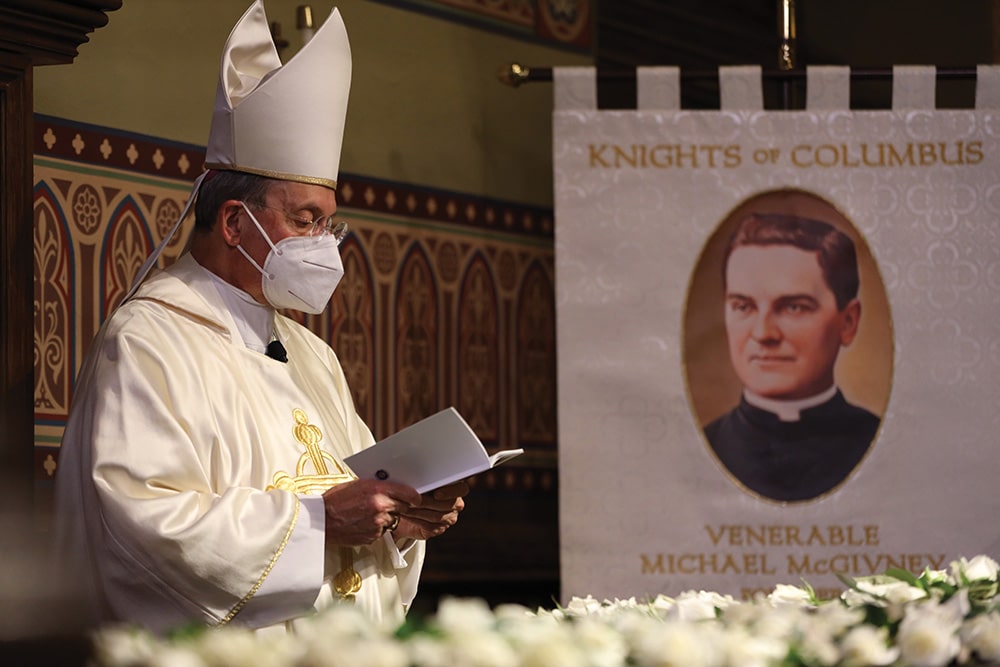
Locked up in the New Haven jail in 1882 was a young man named James “Chip” Smith who was sentenced to death after he killed a police chief. Father McGivney visited him every day, not unusual for the priest who regularly visited the jail anyway. But this young man was in desperate need of Father McGivney’s counsel and ministry. Clearly moved by grief during a Mass he celebrated at the jail for Smith days before his impending execution, Father McGivney characterized his presence at the impending execution as “perhaps the most trying ordeal of my life.” Smith told Father McGivney what a gift he was to him, saying: “Father, your saintly ministrations have enabled me to meet death without a tremor. Do not fear for me, I must not break down now.”
Among the miserable situations he experienced in ministering to others was the case of a certain widow who was at risk of having her family broken up by the state. In Father McGivney’s day, widows had to prove they had income enough to care for their children or else lose them to an orphanage. This was particularly burdensome for Catholics with typically large families. In one instance, Father McGivney stood tall before a magistrate to accept custodianship over a teenaged boy who was at risk of becoming a ward of the state, and was successful in securing enough financial backers to make it possible.
After seven years in New Haven, Father McGivney took up the pastorate at St. Thomas Church in Thomaston, not far from his native Waterbury. The parish was deeply in debt, and one of the primary objectives of his six years there was to lower it. He continued his work in development of the Knights of Columbus from his new parish and helped it begin to spread its reach in those early years. He did this in the face of some jealousy and contempt on behalf of other clergy, who could not comprehend how Father McGivney was motivated by good intentions. At times he even considered withdrawing from his role with the Knights, even though it was a cause most dear to his heart. After all, he had created it so the organization would live on long after his death anyway.
No one would have expected death to come as soon as it did for Father McGivney. At that time, priests were often overworked, which took a toll. In 1886, another parish was added to his charge. Even when assigned an assistant pastor a couple of years later, Father McGivney did not use it as an opportunity to ease up on the tasks before him. Priests then were also regularly exposed to disease, which was the case for Father McGivney when a pandemic spread in 1889. By January 1890, Father McGivney, already of a weak constitution, developed pneumonia as the result of what was then considered to be the influenza. The illness left him further weakened and unable to return to health. After bouts of rest and consultation with doctors in New Haven and New York City, Father McGivney ended up confined to his bed the summer before his 38th birthday, and two days after it, he died on Aug. 14, 1890.
Father McGivney’s holiness was ordinary, yet profound. He didn’t seek the positions of power and prestige that came along with his visionary and groundbreaking leadership. Rather he was interiorly free from the allurements associated with them that can lead one astray. And in that freedom he spent himself entirely for others.
Father McGivney’s memory lives on in the Knights of Columbus and in his archdiocese, which initiated his cause of canonization in 1997. The Knights of Columbus carries on his work to this day. In imitation of his strong faith, members are fortified in the Catholic faith. In the shadow of his charity, the members contribute time, talent and treasure for building up the Church and society. Ultimately, it is to his witness of holiness that the Knights, and now Catholics the world over, can turn for inspiration in their own call to be saints.
Michael R. Heinlein is editor of OSV’s Simply Catholic. He writes from Indiana.
| Other American beati |
|---|
|
Father Michael McGivney’s beatification will be the fourth held on American soil. The rite of beatification enables Father McGivney to be liturgically commemorated locally, in both his native Archdiocese of Hartford and presumably other nearby dioceses, but also for liturgies celebrated by the Knights of Columbus as well. Father McGivney joins five other Americans blesseds awaiting one more miracle for canonization, according to the normal procedures. The beatification of Venerable Archbishop Fulton J. Sheen was postponed just days before it was scheduled to take place in late 2019. With a miracle attributed to his intercession already approved by Pope Francis earlier that year, the delay continues without a reasonable explanation.
Blessed Francis Xavier Seelos (1819-67)
Blessed Miriam Teresa Demjanovich (1901-27)
Blessed Stanley Rother (1935-81)
Blessed Solanus Casey (1870-1957)
Blessed James Miller (1944-82)
|

